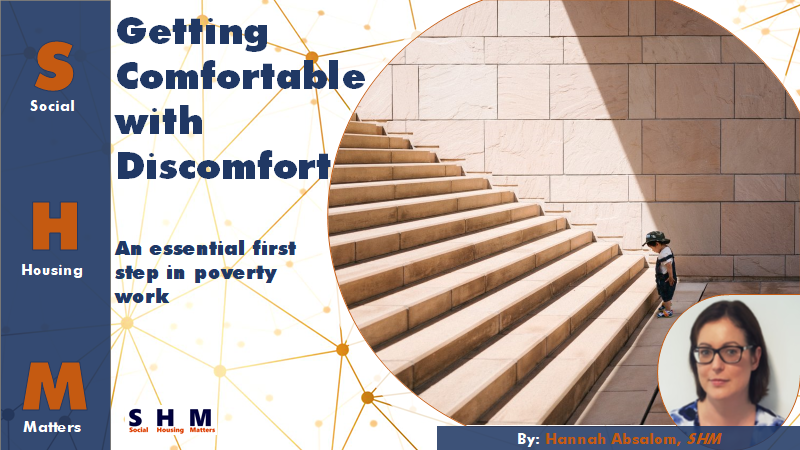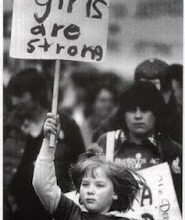
Discomfort may seem like an odd topic to be talking about, so I will explain how I have landed on this as an essential understanding when thinking about poverty. Two factors started me on this journey. The first is my own growing discomfort induced by my research about my own social housing work. Before I started on the research, I was a practitioner for 18 years. I thought I knew what I’d done well and could feel some pride about, and what I could have done better, you know, that ‘continuous improvement’ mindset. Well, the more I immersed myself in my research, the more uncertain and unsettled I became with my assumptions.
The second factor was when I started presenting the early Psychology of Poverty (PoP) findings to the housing sector in the format of focus groups. Now, PoP is not a perfect understanding of poverty, but it certainly deeply impacted my thinking and reflections on the past work I had done, and how my actions may have made things worse. I was anticipating that people attending the focus groups might start feeling a similar way. This did not happen. What became apparent was tenants related to the PoP findings, but landlords did not seem to be connecting with them. They instead skipped straight ahead to thinking of tidy solutions to what is a complex set of problems.
What is meant by discomfort?
Don’t worry… I’m not talking about making you feel guilty or horrified at the real effects of poverty. Sadly, it seems we get used to other people’s hardships and effectively block them out. What I am talking about with the notion of discomfort is a subtle but general sense of unease. Similar to that sense that you might have forgotten something, or a version of that new job feel where everything feels new and a bit uncertain. I think this mindset keeps one’s thinking open and reflective.
Why are people in the housing sector avoiding discomfort?
A simple explanation is psychological security. There’s a reassurance in comfort. In feeling we have ‘done the right thing’. If we feel we have, we can forget about the task and move on to the next one. Our workplaces and work culture encourage and reinforce an emotional disconnect from the work we do. Current cultures of ‘wellbeing’ reinforce the notion that ‘wellness’ and mental health and emotional contentment are part of looking after your workforce. But what if your work involves difficult topics like poverty? A topic that is emotionally loaded and causes very real harm to those it affects? Avoidances of discomfort with this topic strikes me as avoidance of engaging with the topic. If that’s the case, there’s a huge risk our poverty work might not be effective or could even be harmful to the people living in poverty. People who do not have the luxury of avoiding an engagement with the discomfort and hardship poverty brings into their lives.
Another factor that gives rise to discomfort is the general instability in the housing sector. There seems to be an endless cycle of restructures and mergers. While the focus is on trying to rationally reform process within the organisation, so we are more ‘efficient’, do we ever consider the psychological impact this constant instability has on staff? I mean, I can’t really blame practitioners for not wanting to engage with more discomfort and the complexity of poverty when they are working hard to maintain a sense of stability and psychological security within their organisations in the first place.
My final point here is one from behavioural economics. There’s a response we tend to perceive negatively when we see tenants do it, but don’t seem to admonish in ourselves. That’s status quo bias. This simply means a bias towards keeping things as they are. Change brings risk. The status quo is comforting. If we can maintain that by making only incremental changes to our processes, which happen to make us feel good, then why would we change things?
Why do we need to get comfortable with discomfort?
Getting comfortable with discomfort is a key starting point for thinking differently and there are three points to consider. The first is there’s a lot of talk about innovation in the sector, but the hardship and the risk that true innovative thinking involves remains invisible. Being creative and innovative involves struggle and that involves being uncomfortable. This is because being uncomfortable problematises the status quo and our assumptions and allows us to see things with fresh eyes.
The second point is related to empathy. As touched upon, organisations seek to be rational spaces of work. Emotion is seen as ‘unprofessional’ in the workplace. Well, thinking has moved on. Certainly, in work that involves trying to alleviate poverty, one needs both a rational sense and a feel sense to properly engage. Poverty is harmful. It hurts people. To think of ways of alleviating this pain and damage, we need to empathise with it. If we don’t understand it in a ‘feel sense’ way, we risk performing interventions that appear to work from an organisation’s rational perspective but are likely to completely miss the point from an emotional one.
The final point to make here is that we are not separated from the problem of poverty. We are part of it. Understanding this should induce a sense of unease. Both in a sense of increased ethical responsibility and also a very real sense of how complex the problem is. If one is not feeling uncertain, if one is skipping over the difficulty of unease to reach out for ‘solutions’, one is not engaging with the problem and is instead engaging with a process of shoring up psychological comfort.
What does this mean in practice?
What I have outlined above may be hard to hear. We live in a ‘feel good’ culture that associates negative feelings with being bad. It seems one of the worst offences somebody can do nowadays is make someone feel bad (which, in an ironic twist tends to involve making the ‘offender’ feel really very bad, nothing quite like feeling righteous is there?) Yet here I am, saying you need to feel some form of ‘bad’. How dare I! Well, I dare to say it as we have grown complacent. Society has grown more divided. More and more people do not have the privilege of being able to avoid discomforts that are much worse than a bit of intellectual and emotional discomforts. Our desire for our own emotional equilibrium harms others.
In reality I’m not calling for much. The case I put to you is if we want our work to be meaningful; to positively ‘impact’ on those who are living in poverty, we need to feel just a small amount of the discomfort that they are feeling every day. Allowing this feeling to enter our workplaces and our minds is a bedrock of meaningful change that over time may help alleviate the far greater harms caused to many by poverty. So, get comfortable with being uncomfortable, it’s the starting point of engaging meaningfully in poverty.
Author bio

Hannah Absalom is a co-founder of Social housing Matters, a PhD researcher into the use of behavioural insights in social housing in England and the Netherlands and a former practitioner of 18 years.
She is passionate about social housing being better and is currently delivering training on the Psychology of Poverty. The training is about thinking differently about poverty so we can engage with it in more meaningful ways.



